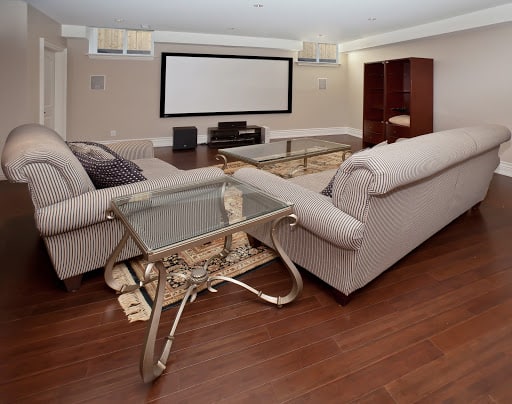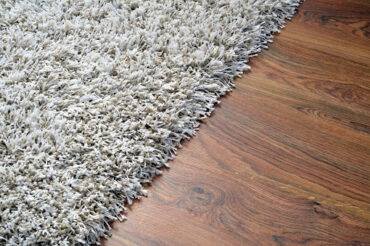
Finishing a basement is one of the most popular home renovation projects among homeowners in the U.S. It’s no wonder because basements house a large amount of unused space that can be turned into a wide variety of options to fit your lifestyle. With a basement renovation, it’s possible to add a family room, an extra bedroom, a bathroom, recreation room, home gym, home office, toy room, craft room, or just about anything you desire.
 Related Read: The Best Time to Add Hardwood Floors during Your Remodeling Project
Related Read: The Best Time to Add Hardwood Floors during Your Remodeling Project
A key part of your basement renovation is choosing a great flooring option – something that will look great, be comfortable, and work on a concrete base, where moisture can sometimes be an issue.
If you thought hardwood floors weren’t an option, because of excess moisture, we have great news for you! For homeowners who love solid hardwood floors, we have a solution – engineered wood floors.
What Are Engineered Wood Floors?
Engineered wood floors are designed for use in places where moisture cannot be controlled, such as on a concrete slab. As opposed to a solid piece of wood, which will warp when exposed to moisture, engineered wood planks are composed of multiple layers of wood that are glued, pressed, heated, and then covered with a thin veneer of wood on top. This process makes the flooring less susceptible to warping. An engineered hardwood floor looks every bit as beautiful as a solid hardwood floor and is typically pre-finished and ready to use right after installation is completed.
Engineered Wood Floors Cost Less Than Solid Wood Floors
Another benefit is that engineered wood is less expensive than solid wood because less expensive woods are used for the lower layers. Some engineered floors with a thin veneer typically cannot be refinished, however, many modern engineered wood floors are made with a thicker veneer that makes refinishing possible. If you’re looking to add the warmth of wood floors to your basement, without risking moisture damage, engineered wood floors are a great option.
Related Read: Top Tips to Prevent Moisture from Damaging Your Wood Floors
Why Install a Moisture Barrier to Wood Floors?
Engineered wood floors should be installed over a moisture barrier and underlayment. Humidity levels below ground are too inconsistent to risk skipping the extra protection afforded by a moisture barrier. There are glue-down options that are designed to protect the finished floor from fluctuating moisture levels below the finished floor. An even better option is to have them professionally installed.
With all of the beautifully engineered hardwood flooring choices on the market today and professional installation methods that include a moisture barrier and underlayment, there’s no reason you can’t enjoy the beauty of a hardwood floor in your new basement living space!





